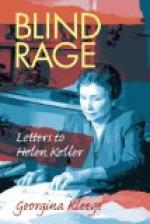Later.—No one allowed outside the station except officers and sergeants. But, dash it all, I can’t leave Hale here the whole day. Our train leaves at 8.36 to-night. The R.T.O. will be here at 7 a.m. Let’s see what we can work. Meanwhile (5.30) the platformless station is full of men, who have just dumped themselves and their kits down where they stood. They haven’t finished sleeping. It looks like a battle-field. They lie in every attitude, officers among them. Hale is eating from his bully-beef tin in silence. A few men stand round a Y.M.C.A. stall drinking coffee or eating chocolate, cake, and stuff.
[Sidenote: ABBEVILLE]
Later.—I got Hale out, and took him to see the cathedral. He said he thought it must have cost a lot of money. Not a bad criticism, either. Then I let him go his own way, and now it’s 1.45 p.m. Had a charming lunch—two oeufs a la coque, the, and croissants. Now I’m sitting by the side of the river—very peaceful. There’s a white goat on the other bank, and its reflection is dancing gently all the time.
Several French widows are talking together near the goat, their black veils hanging funereally; and there’s a small boy with socks and a bowler hat, all black, too. Poor dears!
Good heavens alive! there’s George! He has just flashed by in a car, red cap and all. If only there had been time to hail him! Now for a sleep till it’s time for tea.
September 5.
This is a part of the line I don’t know at all, a most exciting area. I have been up several times into what is by the way of being our front line, but the whole thing is so chaotic that often the Huns come into our trenches and we go into theirs quite by mistake.
I have several times gone right across the open, within full view of Fritz (whom I could see), at a distance of 600 yards. I think they must all be very confused, also, as there is very little rifle fire and very little organized sniping. Nothing but shelling, with the result that for miles and miles there’s just tumbled earth.
The famous woods you read about are mere scratchy little collections of a few tree-stumps splintered and wrecked beyond belief. Things lie scattered everywhere in aimless profusion. Muddy rifles, coats, boots, and every description of kit, both British and Hun. I have met lots of men I know, and everyone is very cheery and hopeful. Fritz is withdrawing his big guns—always a good sign. However, the myriads of prisoners nearly all look a sound type of man still. They are put to work a long way behind the line immediately, which is good.




